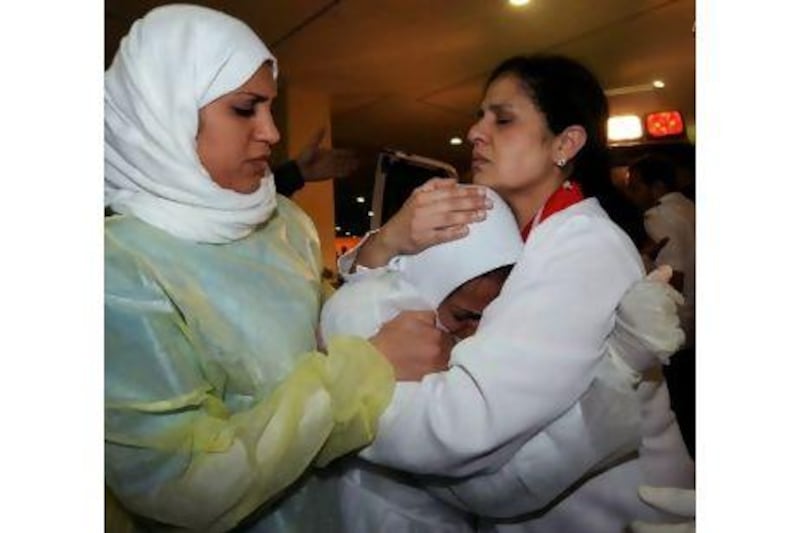Bahrain's special security court yesterday sentenced a protester to death for killing a policeman and gave doctors and nurses who had treated injured protesters during the country's uprising this year long prison sentences, a lawyer said.
Attorney Mohsen Al Alawi said the tribunal, set up during Bahrain's emergency rule, convicted and sentenced 13 medical professionals each to 15 years in prison. In addition, two doctors were sentenced to 10 years each while five other medics got prison terms of five years each.
Yesterday's harsh sentences in the two separate court cases suggest the Sunni authorities in the kingdom will not relent in pursing and punishing those they accuse of supporting the Shiite-led opposition and participating in dissent that has roiled the nation.
Earlier this year, the same special court sentenced two other protesters to death for killing a police officer in a separate incident.
Mr Al Alawi, the lawyer, said the 20 medical professionals, who were charged with various anti-state crimes, and the protester who got the death sentence yesterday can all appeal their verdicts.
A Bahraini rights group identified the protester as Ali Yousef Abdulwahab Al Taweel. The Bahrain Youth Society for Human Rights said that another suspect, Ali Attia Mahdi, was convicted yesterday as Al Taweel's accomplice and sentenced to life imprisonment.
The tribunal's military prosecutor, Yousef Rashid Flaifel, said the two men were convicted of premeditated murder in the killing of an officer in Sitra. In comments to state-run Bahrain News Agency, Mr Flaifel said they committed a "terror act" by running over the policeman with two cars. He didn't say when the incident occurred.
The prosecutor said the two were also convicted of other charges, including participating in a "public protest," and "spreading terror and fear."
Mr Flaifel also said the medics were convicted on charges that include taking part in efforts to "topple the regime," possessing "unlicensed light weapons" and "spreading fabricated stories and lies."
Hundreds of activists have been imprisoned since March when Bahrain's rulers imposed martial law to deal with protests by the country's Shiite majority demanding greater rights and freedoms.
More than 30 people have been killed since the protests began in February. The Sunni monarchy that rules Bahrain responded with a violent crackdown.
Yesterday's sentences came a day after the tribunal upheld sentences for 21 activists convicted for their roles in the protests, including eight prominent political figures who were given life terms on charges of trying to overthrow the kingdom's Sunni rulers.
The court's decision reflected the authorities' unwillingness to roll back punishments for those considered central to the anti-government uprising, although officials have taken some steps to ease tensions. They include releasing some detainees and reinstating state workers purged for suspected support of the protests.
The doctors' trial has been closely watched by rights groups. They have criticised Bahrain's use of the security court, which has military prosecutors and both civilian and military judges, in prosecuting civilians.
Shiites account for about 70 per cent of Bahrain's population of some 525,000 people. They claim they face deep-rooted discrimination such as being blocked from key government and security posts.
The Sunni dynasty, which has ruled the island for more than 200 years, has retained crucial support from the West and Gulf Arab neighbours through the months of protests and crackdowns.
Bahrain's rulers imposed martial law in March and invited a Saudi-led Gulf force to help them deal with the dissent. Sunni rulers Saudi Arabia and the United Arab Emirates fear that any concessions to the Shiite protesters in Bahrain could widen the influence of Shiite powerhouse Iran.
Among the doctors sentenced to 15 years yesterday was Ali Al Iqri, one of Bahrain's acclaimed surgeons who had spoken to media at the height of the protests. Like the others, he worked in the state-run Salmaniya Medical Centre in Manama.
Al Iqri was detained by security forces on March 17. He was taken from an operating room, according to nurses and his relatives, after Bahrain's army overran the hospital complex.
Human Rights Watch last month said more than 70 medical professionals were detained during Bahrain's crackdown, many from the Salmaniya hospital.
Authorities saw the hospital's mostly Shiite staff, some of whom participated in pro-democracy street marches, as protest sympathisers, although the medics claimed they treated all who needed care.
Earlier in September, authorities said all health professionals detained during the crackdowns had been released. Some of them have also been charged for their role in anti-government protests. Their trials are pending.
*Associated Press





